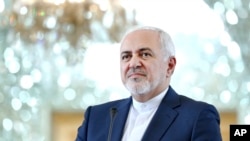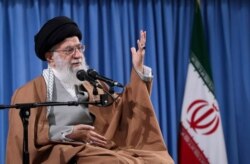Iranian Foreign Minister Mohammed Javad Zarif says his country is willing to negotiate with the U.S., but only if it lifts harsh economic sanctions against the Islamic Republic.
The U.S. imposed sanctions on Iran in 2017 before withdrawing from a 2015 nuclear deal last year that requires Iran to slash its uranium enrichment in exchange for sanctions relief.
"Once those sanctions are lifted ... the room for negotiation is wide open," Zarif said in an NBC News interview that aired Monday.
Zarif, who is in New York for meetings at the United Nations, said the U.S. abandoned a diplomatic approach when it pulled out of the deal. Zarif accused the U.S. of further escalating Middle East tensions by selling billions of dollars of weapons to regional rivals Saudi Arabia and the United Arab Emirates, threatening his country's ballistic missile program.
"These are American weaponry that is going into our region, making our regional ready to explode," he said. "So if they want to talk about our missiles, they need to first stop selling all these weapons, including missiles, to our region."
On Tuesday, Iranian Supreme Leader Ayatollah Ali Khamenei said the country would continue to reduce its commitment to the nuclear deal, while reiterating accusations that European nations are not doing enough to help Iran deal with sanctions.
His comments followed those Monday from an atomic agency spokesman who said Iran's decreasing commitments to the agreement were done "not out of obstinacy" but to give the other parties a chance to "carry out their duties."
President Donald Trump called the nuclear agreement "horrible." Britain, China, France, Germany, and Russia were the other signatories to the accord.
Iran has already withdrawn from parts of the agreement and threatens to back away even further unless the remaining countries help its sanctions-battered economy.
Iran has already exceeded the size of the uranium stockpile permitted under the deal and increased the uranium enrichment level, although it is still nowhere near what is needed to build a nuclear weapon.
But Iran's foreign ministry said it would stay committed to the accord at the same level as the other signatories stay committed to it.
British Foreign Secretary Jeremy Hunt said Monday the 2015 deal “isn't dead yet," and that while the opportunity to find a resolution to the current crisis surrounding the agreement is closing, it is still possible to keep it alive.






